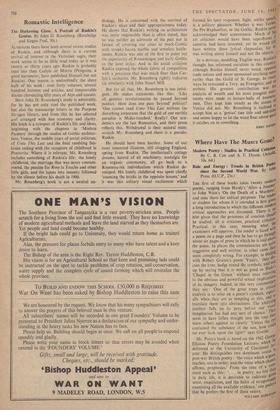Romantic Intelligence
ALTHOUGH there have been several recent studies of Ruskin, and although there is a current revival of interest in the Victorian sages, their work seems to be as little read today as it was twenty or thirty years ago. Ruskin is probably read less than Carlyle or Morris (Penguins, a good barometer, have published Disraeli but not Ruskin). One reason is undoubtedly the sheer bulk of his work : over forty volumes, several hundred lectures and articles, and innumerable diaries chronicling fifty years of Alps and sunsets.
Here John D. Rosenberg's study is admirable, for he has not only read the published work, but also the manuscript letters in the Pierpont Mcrgan library, and from this he has selected and arranged with fine economy and clarity. His book is a synopsis of Ruskin's life and ideas, beginning with the chapters in 'Modern Painters' through the studies of Gothic architec- ture, Venice, the middle years of social criticism, cf Unto This Last and the final rambling fan- tasies ending with the recapture of childhood in Praeterita. Where it is relevant, Mr. Rosenberg includes something of Ruskin's life: the lonely childhood, the marriage that was never consum- mated, the passion for Rose la Touche and other little girls, and the lapses into insanity followed by the silence before his death in 1900.
Mr. Rosenberg's book is not a neutral an- thology. He is concerned with the survival of Ruskin's ideas and their appropriateness today. He shows that Ruskin's writing on architecture was more responsible than is often stated, that he was neither an advocate of the past nor in favour of covering our cities in mock-Gothic with streaky-bacon marble and senseless battle- ments. Ruskin was one of the first to point out the superiority of Romanesque and early Gothic to the later styles. And in his social criticism Ruskin exposed the whole fabric of competition with a precision that was much finer than Car- lyle's outbursts. Mr. Rosenberg rightly indicates Lis similarity with John Stuart Mill.
But for all that, Mr. Rosenberg is too indul- gent. He makes statements like this: 'Like all genuine revolutionaries he passed beyond politics.' How does one pass 'beyond' politics? 'One cannot read Unto This Last without the disturbing awareness that the gold of our earthly paradise is Midas-touched.' Really! Our aca- demics are the last Romantics, and their prose reflects this. Withdrawal is their natural state; scratch Mr. Rosenberg and there is a pseudo- Ruskin.
He should have been harsher. Some of our most treasured illusions, still clogging England, spring from Ruskin. The intellectual's cottagy dreams, hatred of all machinery, nostalgia for art organic community, all go back to a Rousseau-ish individualism which Ruskin de- veloped. His lonely childhood was spent chiefly 'counting the bricks in the opposite houses,' and it was this solitary visual excitement which
formed his later responses. Sight, unlike speech, is a solitary pleasure. Whether it was Turner. the Pre-Raphaelites, or the Gothic, Ruskin neve! acknowledged their separateness. Much of 11.15, art criticism would have been superfluous !I cameras had been invented, yet he would 011 have written those lyrical rhapsodies, for he was writing about himself and not the objects.
In a devious, muddling, English way, Ruskin's thought has informed socialism in this countrY, although Ruskin himself never voted, opposed trade unions and never sponsored anything more earthy than the Guild of St. George. In mail ways he remained a Tory, an Evangelist, and a.11 esthete. His greatest contribution was his analysis of wealth and his most pungent state" ments were made to lecture-halls of business: men. They kept him steady as the stones °I Venice did not. Mr. Rosenberg is inclined I° accept him as a 'genius' (see title and sub-til and seems happy to let the word float about unt it catches on to something. JOHN DAN°


































 Previous page
Previous page